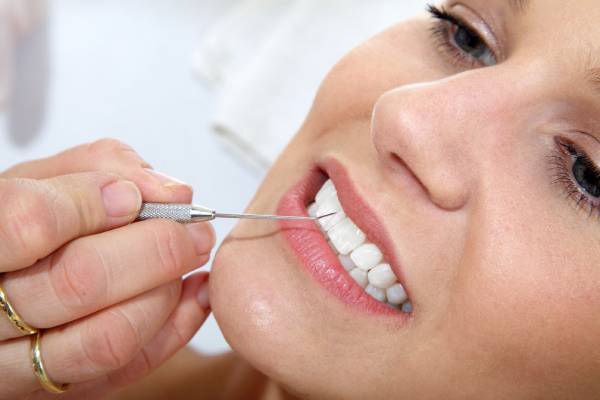
When you visit the dentist for a hygiene visit, you might have been surprised by how many different techniques the hygienist used to clean and examine your teeth. In many cases, they may have used a special tool that looks like a hook on each end. These plaque scrapers are used for dental scaling to help keep your teeth and gums healthy.
What Is Dental Scaling
Dental scaling is a standard dental cleaning procedure using a plaque scraper to remove hardened plaque from your teeth. It’s something that your hygienist or dentist performs almost every day. While it may seem like a simple technique, proper use of the plaque scraper allows them to clean your teeth efficiently without risk of damaging your teeth.
The process of dental scaling is simple and straight-forward. Your dentist or hygienist will use one end of the tool to scrape away any identified hardened plaque. Dental scaling isn’t typically painful. At most, patients sometimes describe some minor discomfort from the scraping sensation.
While plaque scrapers are widely available, patients are discouraged from attempting to use them in their own home on themselves or their family members. Without proper training and education, it’s possible for you to injure yourself or cause new problems by using them incorrectly.
What Are the Benefits of Dental Scaling?
Poor dental habits allow bacteria to collect and harden into plaque or tartar on your teeth. When you reach this point, typical brushing or flossing won’t be enough to completely remove it all.
Scaling is the next step up in the fight against plaque. Without it, the plaque would remain on your teeth, wearing away your enamel and irritating your gums. Over time, this would exacerbate gum disease and lead you on the path towards developing serious periodontal disease.
Thorough dental scaling allows your teeth to “reset” to normal dental care. When complete, along with the other cleaning procedures performed at your hygiene visit, you’ll be able to resume standard brushing and flossing to keep bacteria at bay.
Is Dental Scaling Always Necessary?
No. In most cases, scaling is a step taken after weeks to months of poor dental care that allowed bacteria to gain a foothold and harden on your teeth. If you brush regularly, most bacteria won’t be able to reach this stage.
However, even if you do brush adequately, plaque can still form in small deposits in harder to reach places along your teeth. If you require dental planing, it doesn’t necessarily mean you didn’t brush well. This is why it’s important to stay up-to-date with your dental check-ups. Every mouth is different, and plaque can form quickly.
What Is Root Planing?
Dental scaling is often paired with another process known as root planing. It attacks plaque on your teeth in a similar fashion, except that root planing is focused on hardened plaque that’s below your gumline.
As plaque spreads on your teeth, it won’t stay in areas easy to brush. Plaque will spread downwards, pushing under the gums and essentially detaching your gums from your teeth.
While the plaque alone is harmful to both your teeth and gums, the additional space it creates allows for even more bacteria to spread and thrive. Even more concerning is that once bacteria reaches below your gums, it’s no longer functionally possible for you to manage at home.
Root planing clears away the plaque deep against your gums and allows your gums to return to their healthy position against your teeth.
You Can Avoid Dental Scaling & Root Planing
If dental scaling or root planing make you feel uncomfortable, the best thing you can do is to improve your dental habits at home. If you take care to brush your teeth fully and effectively, you can prevent plaque from forming in most cases.
Any time you visit your dentist, they can identify areas of your mouth that are lacking from proper brushing or flossing. If they notice specific areas of your mouth with recurring plaque, it may be a sign that you need to adjust your brushing pattern or look into buying a more effective toothbrush.
Contact Walbridge Dental
Do you have toothache pain? We can help! The professionals at Walbridge Dental provide complete family dental care to families in the Millbury community. Contact us online to set up an appointment now or call us at 419-836-1033.
Connect on Social Media!

